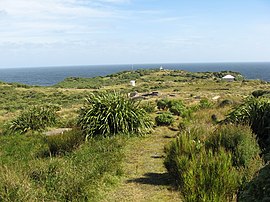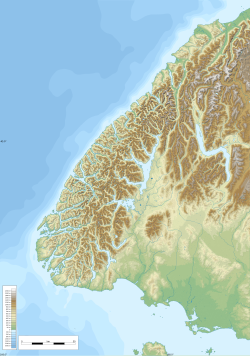Puysegur Point is a headland located in the far southwest of the South Island of New Zealand.[1] It lies within Fiordland National Park on the southern head of Preservation Inlet and is 145 kilometres (90 mi) west-northwest of Invercargill. The name 'Puysegur' was bestowed by Lieutenant Jules Dumont d'Urville or Midshipman Jules de Blosseville during a South Pacific expedition of La Coquille; probably in honour of the French naval officer Antoine-Hyacinthe-Anne de Chastenet de Puységur (1752–1809).
Puysegur Point
Tawhitiwhiti-roro (Māori) | |
|---|---|
 Puysegur Point Lighthouse and foundations of old lighthouse keepers buildings | |
| Coordinates: 46°09′22″S 166°36′36″E / 46.156°S 166.61°E | |
| Location | Fiordland, Southland District, New Zealand |
| Offshore water bodies | Tasman Sea, Rakituma / Preservation Inlet |
| Native name | Tawhitiwhiti-roro (Māori) |
Geography
editPuysegur Point has been said to be the windiest place in New Zealand, with gales recorded on an average of 48 days a year.[2] The 2009 Dusky Sound earthquake[3] pushed Puysegur Point closer to Australia by 30 centimetres (12 in).[4]
Biodiversity
editHumpback whales pass the point during annual migrations.[5]
Lighthouse
editA lighthouse on the point was first illuminated on 1 March 1879. The original wooden lighthouse was destroyed in an arson attack in 1942.[6] The lighthouse was operated by permanent lighthouse keepers from its establishment in 1879 until it was temporarily shutdown in 1980, with a further period of staffed operation from 1987 until it was fully automated and destaffed in 1989.[7]
The landing
editThe main access to Puysegur Point and the lighthouse is via a track from a beach landing point at Otago Retreat - a narrow waterway between the mainland and Coal Island in Preservation Inlet to the north west of the point.[8] The name Otago Retreat originates from the passage of the schooner Otago that found shelter in this narrow passage during a voyage accompanying the survey ship HMS Acheron on a survey of the South Island around 1850-51.[9][10][11] There are buildings remaining at the landing that formerly served the lighthouse. One of the buildings is a Department of Conservation shelter, known as the Landing Shed.[12]
Climate
edit| Climate data for Puysegur Point (1991–2020 normals, extremes 1978–present) | |||||||||||||
|---|---|---|---|---|---|---|---|---|---|---|---|---|---|
| Month | Jan | Feb | Mar | Apr | May | Jun | Jul | Aug | Sep | Oct | Nov | Dec | Year |
| Record high °C (°F) | 24.9 (76.8) |
26.0 (78.8) |
27.5 (81.5) |
23.2 (73.8) |
20.9 (69.6) |
18.1 (64.6) |
17.2 (63.0) |
17.8 (64.0) |
20.3 (68.5) |
22.1 (71.8) |
22.7 (72.9) |
24.7 (76.5) |
27.5 (81.5) |
| Mean daily maximum °C (°F) | 16.6 (61.9) |
16.6 (61.9) |
15.7 (60.3) |
14.3 (57.7) |
12.7 (54.9) |
11.0 (51.8) |
10.7 (51.3) |
11.1 (52.0) |
12.0 (53.6) |
12.7 (54.9) |
13.7 (56.7) |
15.4 (59.7) |
13.5 (56.4) |
| Daily mean °C (°F) | 13.9 (57.0) |
14.1 (57.4) |
13.2 (55.8) |
12.0 (53.6) |
10.5 (50.9) |
8.8 (47.8) |
8.4 (47.1) |
8.7 (47.7) |
9.6 (49.3) |
10.2 (50.4) |
11.1 (52.0) |
12.8 (55.0) |
11.1 (52.0) |
| Mean daily minimum °C (°F) | 11.3 (52.3) |
11.6 (52.9) |
10.7 (51.3) |
9.6 (49.3) |
8.3 (46.9) |
6.5 (43.7) |
6.1 (43.0) |
6.3 (43.3) |
7.1 (44.8) |
7.7 (45.9) |
8.6 (47.5) |
10.2 (50.4) |
8.7 (47.6) |
| Record low °C (°F) | 5.7 (42.3) |
5.2 (41.4) |
4.0 (39.2) |
3.0 (37.4) |
1.8 (35.2) |
−1.5 (29.3) |
−0.3 (31.5) |
0.1 (32.2) |
1.1 (34.0) |
1.7 (35.1) |
1.3 (34.3) |
0.6 (33.1) |
−1.5 (29.3) |
| Average rainfall mm (inches) | 224.9 (8.85) |
203.0 (7.99) |
225.9 (8.89) |
207.0 (8.15) |
240.6 (9.47) |
209.5 (8.25) |
197.1 (7.76) |
211.0 (8.31) |
193.9 (7.63) |
234.8 (9.24) |
235.6 (9.28) |
195.7 (7.70) |
2,579 (101.52) |
| Source: NIWA[13][14] | |||||||||||||
References
edit- ^ "Place name detail: Puysegur Point". New Zealand Gazetteer. New Zealand Geographic Board. Retrieved 28 March 2009.
- ^ "Puysegur Point". Ashburton Guardian. 13 April 1950. Retrieved 29 January 2023 – via Papers Past.
- ^ "Magnitude 7.6 - OFF WEST COAST OF THE SOUTH ISLAND, N.Z." Archived from the original on 12 August 2009. Retrieved 31 May 2014., retrieved 24 August 2009
- ^ Ramnarayan, Abhinav (22 July 2009). "Earthquake brings New Zealand closer to Australia". The Guardian. Retrieved 4 August 2020.
- ^ Dawbin, H. W. (1995) The Migrations of Humpback Whales which Pass the New Zealand Coast. Transactions and Proceedings of the Royal Society of New Zealand. Volume 84, 1956–57. pp.147–196. Department of Zoology, Victoria University College, Wellington. National Library of New Zealand. Retrieved on 9 July 2014
- ^ "Keeper assailed - Lighthouse set on fire - Puysegur sensation". Evening Star. 10 February 1942. Retrieved 28 January 2023 – via Papers Past.
- ^ "Puysegur Point lighthouse - Maritime NZ". www.maritimenz.govt.nz. Retrieved 28 January 2023.
- ^ "Still exploring Fiordland - Part 2". Power Boat Magazine. Retrieved 2 February 2022.
- ^ "The cruise of the Luna". Wellington Independent. 13 March 1874 – via Papers Past.
- ^ "The Acheron arrives to survey New Zealand waters". nzhistory.govt.nz. Retrieved 2 February 2023.
- ^ "The Acheron's Late Surveying Cruise". New Zealander. 30 April 1851. Retrieved 2 February 2023 – via Papers Past.
- ^ "Landing Shed". Department of Conservation. Retrieved 30 January 2023.
- ^ "CliFlo – National Climate Database : Puysegur Point Aws". NIWA. Retrieved 19 May 2024.
- ^ "CliFlo -The National Climate Database (Agent numbers: 4140, 4141)". NIWA. Retrieved 20 June 2024.
External links
edit- Puysegur Point lighthouse at Maritime New Zealand
- Puysegur Point - Furthest Frontier II - EP7 video at Youtube

